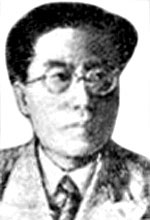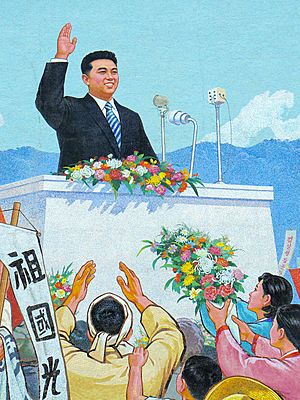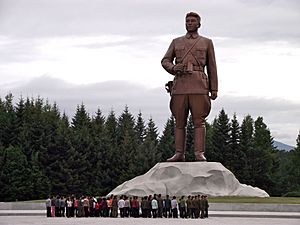Cho Ki-chon facts for kids
Quick facts for kids
Cho Ki-chon
|
|
|---|---|
 |
|
| Born | 6 November 1913 Ael'tugeu, Vladivostok District, Russia |
| Died | 31 July 1951 (aged 37) Pyongyang |
| Resting place | Patriotic Martyrs' Cemetery |
| Nickname |
|
| Occupation | Poet |
| Language | Korean |
| Nationality | Korean |
| Alma mater | Gorky Omsk State Pedagogical University |
| Genres | Epic poetry, lyric poetry |
| Subject | Cult of personality of Kim Il-sung |
| Literary movement | Socialist realism |
| Notable works | Mt. Paeketu, "Whistle" |
| Notable awards |
|
| Spouse | Kim Hae-sŏn (m. late 1930s) |
| Children | Yurii Cho |
| Korean name | |
| Chosŏn'gŭl | |
| Hancha | |
| Revised Romanization | Jo Gi-cheon |
| McCune–Reischauer | Cho Ki-ch'ŏn |
|
|
|
Cho Ki-chon (Korean: 조기천; born November 6, 1913 – died July 31, 1951) was a famous poet from North Korea. He was born in Russia to Korean parents. Many people see him as the "founding father" of North Korean poetry.
Cho Ki-chon's poems had a special style influenced by Soviet literature. This style, called socialist realism, became very important in North Korean writing. He was even called "Korea's Mayakovsky" because he was inspired by the Russian poet. Later, he was also called the "Pushkin of Korea."
After World War II, Soviet leaders sent Cho to Korea in 1945. They wanted him to help set up cultural groups in the new North Korean state, following the Soviet way. Cho did this and also helped develop socialist realism, which became a key part of North Korean art and literature.
He wrote some of the first poems praising Kim Il-sung, North Korea's first leader. His most famous work is Mt. Paektu (1947). This long poem praised Kim Il-sung's actions as a guerrilla fighter. Another well-known poem is "Whistle," a love poem that later became a popular song in both North and South Korea.
Cho Ki-chon wrote poems to support North Korea during the Korean War. He died during the war in an American bombing raid. His poems are still well-known and respected in North Korea today.
Contents
Who Was Cho Ki-chon?
Cho Ki-chon was born on November 6, 1913. His family were poor Korean farmers in a village near Vladivostok, Russia. The part of the Soviet Union where he lived was a hub for Koreans who wanted their country to be free.
Cho was inspired by another Korean writer in the Soviet Union, Cho Myong-hui. This writer believed in freedom for Korea through socialist ideas. He wrote about anti-Japanese fighters. This helped Cho Ki-chon develop a strong sense of national pride and class awareness in his own writing.
Early Life and Education
From 1928 to 1931, Cho studied at the Korean Teachers College in Ussuriysk. During this time, he was also a member of the Komsomol, a communist youth group in the Soviet Union.
Cho had planned to study at Moscow University. But he was robbed at a train station in Omsk and lost all his money. He had to work on a farm for the summer to earn some money. The head of Omsk University, Aleksandr Sergeevitch Slivko, heard his story and let him join the university.
So, from 1933 to 1937, Cho studied literature at the Gorky Omsk State Pedagogical University. Even though he wasn't fluent in Russian when he started, he graduated with excellent grades. His time there made him more connected to Russian and Soviet culture.
After graduating, he went back to the Far East to teach at the Korean Pedagogical Institute in Vladivostok. However, in 1937, all ethnic Koreans in the Soviet Union were forced to move to Central Asia. So, the Institute and Cho moved to Kzyl-Orda, Kazakhstan.
In 1938, Cho tried to enroll at Moscow Literature University. But he was arrested because he had broken the rule that confined Koreans to Central Asia. He then returned to the Institute in Kzyl-Orda and worked there until 1941. In the late 1930s, Cho married Kim Hae-sŏn. They had a son named Yurii Cho in 1939.
From 1942 to 1945, Cho worked for the Soviet military. Part of his job was to write propaganda leaflets for the Soviet Red Army in Korea. It is believed that he also translated Kim Il-sung's first speech after Korea's liberation on October 14, 1945. This speech was originally written by Soviet officers. Cho entered North Korea with the Red Army that year.
Writing in North Korea
After Korea was freed from Japanese rule, Soviet leaders sent Cho to North Korea. He spoke both Korean and Russian fluently. His job was to help set up the country's literary groups based on the Soviet system.
Cho followed the Workers' Party's advice to "immerse oneself in the masses." This meant he visited factories, villages, and farms. He then wrote poems based on these experiences. His time in the Soviet Union helped him create works that were clearly political. Many other writers found it hard to write about political topics or visit workplaces.
Cho played a key role in shaping North Korean literature. His early works, Mt. Paektu (1947) and Land (1946), showed the path North Korean literature would take. These works soon became models for other writers. When he returned, he started writing for Chosŏn Sinmun, a Korean-language newspaper of the Soviet Red Army. He worked as a reporter and translator. He translated works by Soviet poets like Mayakovsky and Jambyl Jabayev.
During the Korean War, Cho worked for Rodong Sinmun, a major newspaper. He also wrote poems to support the war effort. In 1951, he became the vice-chairman of the Korean Federation of Literature and Arts.
Cho Ki-chon's Works
Poems from the Soviet Union
While he was still at the Pedagogical Institute, Cho wrote a novel about the anti-Japanese armed struggle. This novel was similar to his later work, Mt. Paektu. It might have been an early version of that famous poem.
Cho was also interested in drama. He helped create a play called Hong Beom-do, about the revolutionary Hong Beom-do. Mt. Paektu also took some ideas from this play. Cho published his first poem at age 17 in a Korean newspaper in Russia called Sŏnbong. Between 1930 and 1933, he wrote poems like "The Morning of the Construction" and "To the Advanced Workers."
Poems from North Korea
After moving to North Korea, Cho wrote "New Year." Other poems include "Tuman River" (1946), which describes the suffering of Koreans under Japanese rule. "Our Way" (1949) is about the friendship between the Soviet Union and Korea.
The Song of Life (1950) is a long poem about building up industries. It praises the country's growing industry. It also talks about "class enemies" who try to stop progress, a common theme in Soviet-era stories. Other poems include "Aircraft Hunters," "Korean Mother" (1950), and "My Heights" (1951). He also wrote lyrical poems like "Swing" and "Sitting On a White Rock" (1947).
The poem Resistance in Yosu tells the story of the Yosu uprising in South Korea. The poem Land was written because the Workers' Party asked for works about land reform after Korea's liberation. It was the first poem to describe this topic.
Some of Cho's poems have become popular songs in both North and South Korea. "Whistle" (Hŭip'aram), "Willow," and "Swing" are love songs. They were inspired by Russian poetry that was translated into Korean. "Whistle," which became a popular song in 1990, is often seen as a non-political love song in South Korea. However, it actually has political and cultural ideas from Soviet lyrical poetry. For example, in "Whistle," the couple shows good socialist qualities:
Today you again smiled purely,
And said that you have overfilled the production plan threefold,
But I do not envy your achievement,
I can do even better,
But I like your smile.
Why is it so pure?
His Famous Poem: Mt. Paektu
Cho's long poem Mt. Paektu (Korean: 백두산; Hanja: 白頭山) was written in February 1947 and published in 1948. It was the first poem written about Kim Il-sung. The poem tells the story of the Battle of Pochonbo in 1937. It is a classic work about the fight against Japan. The poem strongly connects Kim Il-sung with Paektu Mountain. This connection is still a key part of North Korean propaganda today.
Cho was fascinated by the anti-Japanese guerrilla fighters. He had even met some of them. The poem was also written for political reasons. The Soviets, who sent Cho to North Korea, wanted to make Kim Il-sung's power stronger. They needed stories that showed him as a legendary hero who fought against Japan. That's how Mt. Paektu was created. The poem is dedicated to the "glorious Soviet Army that liberated Korea."
Mt. Paektu was printed hundreds of thousands of times. This was more than any other work in Korean literature before it. People generally liked the poem, especially young readers. Kim Il-sung himself liked the poem very much. He even visited Cho's home. In his memoirs, Kim wrote that he was the first person to hear Cho recite the poem. He said he liked its "jewel-like sentences" and that they both "shed tears" when Cho read about fallen comrades.
The poem Mt. Paektu exaggerates Kim Il-sung's actions during the liberation struggle. It shows Kim as a heroic, kind, and strong leader. He is presented as a popular hero whom people admire. This suggests he is the right person to lead the new country. Politically, Mt. Paektu was very effective in the newly formed state. It became a "new classic" and a model for the cult of personality of Kim Il-sung that continued in North Korean literature.
The poem has been changed three times to fit changes in North Korea's political system. The original version of the poem mentioned heroes from the Russian Civil War. But newer versions remove them and focus only on Korean figures.
The poem has been translated into many languages, including English, French, German, Russian, and Chinese.
Death and Legacy
Cho Ki-chon died on July 31, 1951. He was in his office in Pyongyang during an American bombing raid during the Korean War.
His poem Mt. Paektu received the National Prize, first class, in 1948. Cho's works also won the Festival Prize, which is North Korea's highest literary honor. He also received the Order of the National Flag, second class, in 1951 for his work during the war. After his death, he was given another National Prize, first class, in 1952 for his poems called Korea is Fighting.
Cho is buried at the Patriotic Martyrs' Cemetery in Pyongyang. Today, he is seen as the founder of North Korean socialist realist poetry. Some even consider him the founder of North Korean literature as a whole. In the mid-1950s, many Soviet Koreans, including Cho's friends, lost their official recognition. But because Cho died early in 1951, his reputation was saved. Except for a short time in the 1970s, his legacy has remained popular in North Korea.
 | Calvin Brent |
 | Walter T. Bailey |
 | Martha Cassell Thompson |
 | Alberta Jeannette Cassell |



